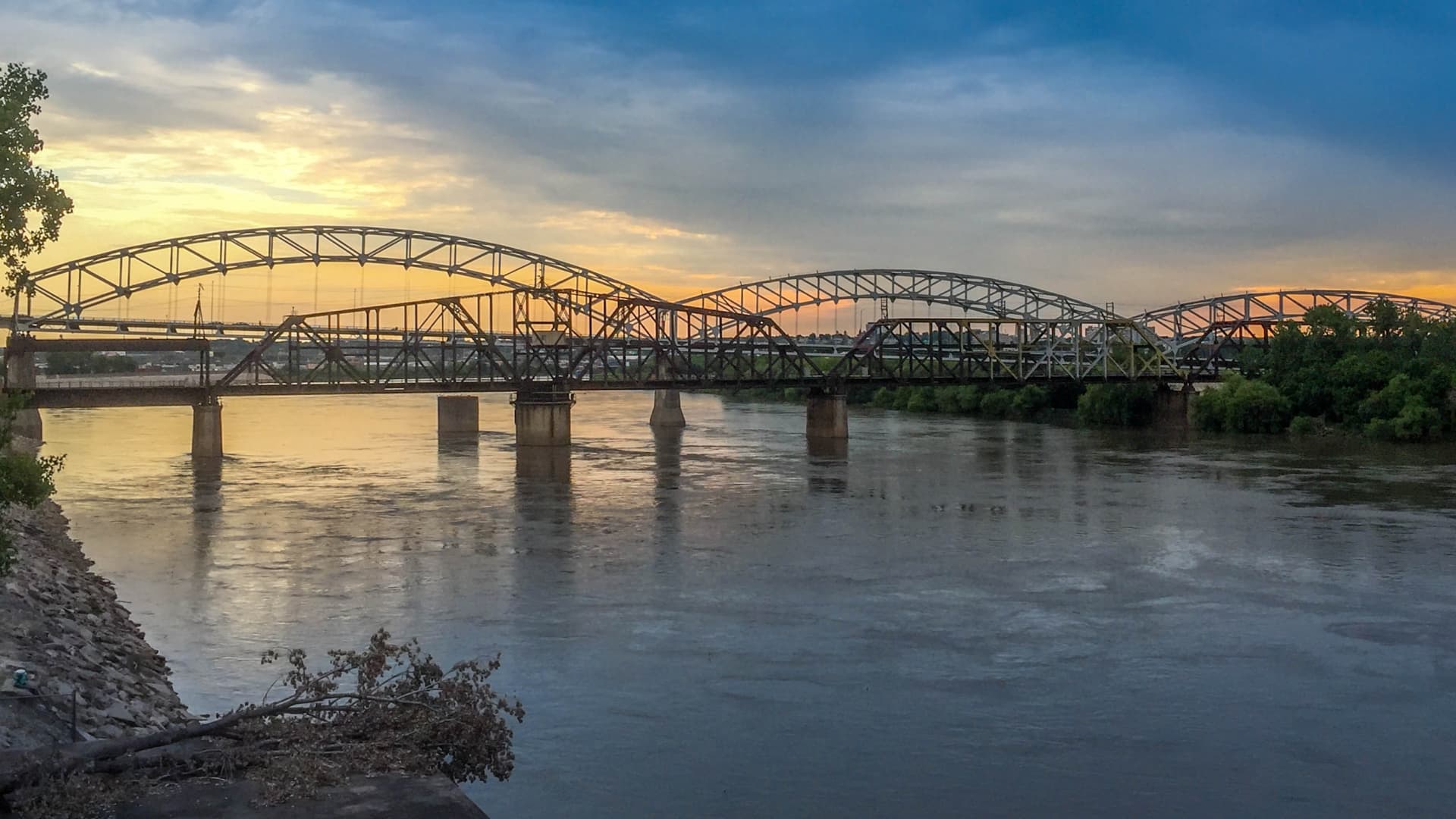These are the 10 states with America’s best infrastructure


The $1 trillion bipartisan infrastructure bill signed into law by President Joe Biden late last year is a game changer, including more than $500 billion in new spending for longstanding needs including roads, bridges, electrical grid improvements, along with money for newer needs like broadband service and electric vehicle charging stations.
According to the White House, much of that money will go directly to the states, with the biggest states — California, Texas, and New York — in line to receive more than $45 billion in direct aid.
The funds are also critical in the nationwide push to rebuild the domestic supply chain. States that are fighting to lead that effort and are courting companies are touting their infrastructure. It is a major factor in CNBC’s annual America’s Top States for Business rankings. Under our methodology, we measure roads, bridges, ports and airports, as well as water and electric utilities, sites available for development, and sustainability.
Some states are badly lagging in this effort. For them, the federal funds can’t come soon enough.
But these states are leading the way.
10. Missouri
In the heart of the Heartland, Missouri is a vital transportation link. Now, the Show Me State is showing us the money, including $8.7 million in new funding for mass transit in the state budget passed in May. And Missouri is in the midst of a quarter billion-dollar project to replace the iconic but aging Buck O’Neil Memorial Bridge in Kansas City.
2022 Infrastructure score: 234 out of 380 points (Top States Grade: B+)
U.S. population within 500 miles: 86,012,156
Bridges in poor condition: 9%
Roads in unacceptable condition: 7%
Broadband access: 83.7%
Power outages per year: 2.5 hours
9. Virginia
Aiming to relieve congestion on one of the nation’s most important highway corridors, Virginia is in the midst of a $3.8 billion project to rebuild and expand the Hampton Roads Bridge-Tunnel. The project, which includes widening Interstate 64 and building new, twin tunnels under the harbor, is the largest highway construction project in state history, and one of the largest in the country.
2022 Infrastructure score: 235 out of 380 points (Top States Grade: B+)
U.S. population within 500 miles: 124,121,141
Bridges in poor condition: 4%
Roads in unacceptable condition: 13%
Broadband access: 89.3%
Power outages per year: 5.1 hours
8. Tennessee
The home of the New Deal-era Tennessee Valley Authority is a leader in infrastructure planning, and not shying away from critical decisions. Since the 1990s, the state has produced an annual, five-year inventory of transportation needs. The most recent inventory, issued in January, identifies $61.9 billion in needs. It predates Ford‘s plans to build a massive electric vehicle production facility, known as Blue Oval City, in the western part of the state. But true to form, Tennessee is vowing to be ready.
2022 Infrastructure score: 236 out of 380 points (Top States Grade: B+)
U.S. population within 500 miles: 106,951,213
Bridges in poor condition: 4%
Roads in unacceptable condition: 9%
Broadband access: 81.4%
Power outages per year: 9.8 hours
6. (tie) Kansas
Its location in the geographic center of the nation makes transportation central to just about everything Kansas does. So it should come as no surprise that the state’s roads and bridges are the best in the country according to our study — well maintained, with a breezy average commute of less than 20 minutes. And only a handful of states carry more freight than Kansas’s bustling railroads.
2022 Infrastructure score: 239 out of 380 points (Top States Grade: B+)
U.S. population within 500 miles: 42,734,157
Bridges in poor condition: 5%
Roads in unacceptable condition: 5%
Broadband access: 88.9%
Power outages per year: 1.8 hours
6. (tie) Arizona
In a state where summertime temperatures can soar well into the triple digits — with a chance of monsoons — the power grid is critical. Arizona’s electrical grid more than meets the challenge, with the most reliable power in the country, according to U.S. Department of Energy data. The Sunshine State is also working to improve its highways, including a major project to rebuild State Route 189, connecting the U.S.-Mexico border crossing with Interstate 19 north of Nogales, completed this year at a cost of $134 million.
2022 Infrastructure score: 239 out of 380 points (Top States Grade: B+)
U.S. population within 500 miles: 42,324,927
Bridges in poor condition: 1%
Roads in unacceptable condition: 13%
Broadband access: 88.4%
Power outages per year: 1.2 hours
5. Nevada
Long before the bipartisan infrastructure bill, Nevada was thinking ahead, establishing the innovative Nevada State Infrastructure Bank in 2017 to fund state projects. But legislators did not actually fund the bank until last year. Now, with $75 million in state funds on top of the federal money in the infrastructure bill, the bank is busily prioritizing projects in affordable housing, schools, and fixing roads that are already among the best in the nation.
2022 Infrastructure score: 241 out of 380 points (Top States Grade: B+)
U.S. population within 500 miles: 51,962,352
Bridges in poor condition: 1%
Roads in unacceptable condition: 5%
Broadband access: 94.2%
Power outages per year: 1.2 hours
4. Minnesota
When the bridge carrying Interstate 35W over the Mississippi River in Minneapolis collapsed almost exactly 15 years ago, it was the worst kind of wakeup call for the North Star State. Thirteen people died in the collapse, and the state came face-to-face with years of neglect. A new bridge opened just one year later, and the state overhauled its funding for roads and bridges. While those facilities are now the 6th best in the country, according to our rankings, it is a constant battle in a state known for punishing weather extremes.
2022 Infrastructure score: 244 out of 380 points (Top States Grade: A-)
U.S. population within 500 miles: 33,134,316
Bridges in poor condition: 5%
Roads in unacceptable condition: 6%
Broadband access: 85.1%
Power outages per year: 2.1 hours
3. Illinois
Serving 54 million passengers last year, Chicago’s O’Hare International Airport is among the busiest in the world. That helps make Illinois a leader in air travel, contributing to its strong overall infrastructure score. But business travelers tend to look at the aging airport as a place to avoid on their itinerary if they can help it. Now, O’Hare is in the midst of a $8.5 billion project to completely reimagine its 1960s-vintage terminals. The so-called O’Hare 21 project is due to be done in 2028.
2022 Infrastructure score: 256 out of 380 points (Top States Grade: A)
U.S. population within 500 miles: 90,303,753
Bridges in poor condition: 9%
Roads in unacceptable condition: 21%
Broadband access: 90.6%
Power outages per year: 5.5 hours
2. Ohio
With more than 40% of the U.S. population within a day’s drive, all roads really do lead to Ohio. Along with most railways and waterways. The Buckeye State’s central location is one of the reasons Intel decided to build a massive $20 billion chip manufacturing complex outside of Columbus. The company has dubbed the new campus “Silicon Heartland,” helping Ohio shake its rust belt image once and for all.
2022 Infrastructure score: 260 out of 380 points (Top States Grade: A)
U.S. population within 500 miles: 140,172,976
Bridges in poor condition: 5%
Roads in unacceptable condition: 15%
Broadband access: 88.2%
Power outages per year: 4.7 hours
1. Indiana
Carrying some 277 million tons of cargo per year, Indiana’s rail network is among the busiest in the nation. It helps the Hoosier State earn its title as the Crossroads of America. But Indiana also scores well overall for sustainability. While it lags somewhat in renewable energy, the state’s central location serves it well. Hoosiers endure less extreme weather than some of their Midwest neighbors, with low risks of wildfires or floods.
2022 Infrastructure score: 274 out of 380 points (Top States Grade: A+)
U.S. population within 500 miles: 110,877,487
Bridges in poor condition: 6%
Roads in unacceptable condition: 6%
Broadband access: 87%
Power outages per year: 3 hours
This post has been syndicated from a third-party source. View the original article here.




